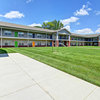0
Publication
Community:
Founded in 1995 as Project Women, Family Scholar House (FSH) provides comprehensive, holistic services for disadvantaged single parents, their children, and foster alumni. The nonprofit seeks to end the cycle of poverty and transform communities by empowering families and youth to succeed in education and life-long self-sufficiency. FSH provides supportive housing, educational programming, and participant advocacy to help families gain independence.
Authored by: American Planning Association
Topics: Dual-generation, Early childhood, Education, Homelessness, Housing, Low-income, Partnerships, Place-based, Post-secondary, South, Stability
 Shared by Mica O'Brien
Shared by Mica O'Brien
Mica O'Brien posted a
on Apr 18, 2019
American Planning Association
Founded in 1995 as Project Women, Family Scholar House (FSH) provides comprehensive, holistic services for disadvantaged single parents, their children, and foster alumni.
0
Interactive
Community:
Sep 18, 2018
Understanding the characteristics of infants and toddlers in our states and communities is an important first step for supporting children’s development during their most critical years. Making more detailed and comprehensive information available on the young children living in different communities can help stakeholders more strategically develop and target key services such as child care, home visiting, or other services for young children. For example, knowing how many young children live in low-income families and what share have parents working full time can help states and localities tailor child care investments and services to reach those families who most need assistance.
Authored by: Cara Lou and Gina Adams for Urban Institute
Topics: Early childhood, East Coast, Health, Legislation & Policy, Midwest, South, West Coast
 Shared by Mica O'Brien
Shared by Mica O'Brien
Mica O'Brien posted a
on Sep 18, 2018
Cara Lou and Gina Adams for Urban Institute
Understanding the characteristics of infants and toddlers in our states and communities is an important first step for supporting children’s development during their most critical years.
0
News Article
Community:
Jan 24, 2018
Authored by: Lee Romney for EdSource
Topics: Child welfare, Early childhood, Education, Mental health, Post-secondary, Research, Safety, South, Youth
 Shared by Housing Is
Shared by Housing Is
Housing Is posted a
on Jul 5, 2018
0
Case study
Community:
Jul 10, 2017
These case studies provide a framework for implementing
or replicating promising approaches to use two-generation initiatives
specifically with housing authority residents as means to improve
life outcomes. This report features communities in San Antonio, Texas and
Durham, North Carolina to examine the key components of two-generation
initiatives: social capital; early childhood education;
post-secondary education and workforce development; economic
assets; and health and well-being.
Authored by: Abra Lyons-Warren & Amber-Lee Leslie for HOUSING IS, CLPHA
Topics: Child welfare, Dual-generation, Early childhood, Education, Family engagement, Housing, Partnerships, Place-based, South, Workforce development
 Shared by Abra Lyons-Warren
Shared by Abra Lyons-Warren
Abra Lyons-Warren posted a
on Jul 18, 2017
Abra Lyons-Warren & Amber-Lee Leslie for HOUSING IS, CLPHA
These case studies provide a framework for implementing
or replicating promising approaches to use two-generation initiatives
specifically with housing authority residents as means to improve
life outcomes.



 Shared by Housing Is
on Jul 5, 2018
Shared by Housing Is
on Jul 5, 2018
 Shared by Abra Lyons-Warren
on Jul 18, 2017
Shared by Abra Lyons-Warren
on Jul 18, 2017